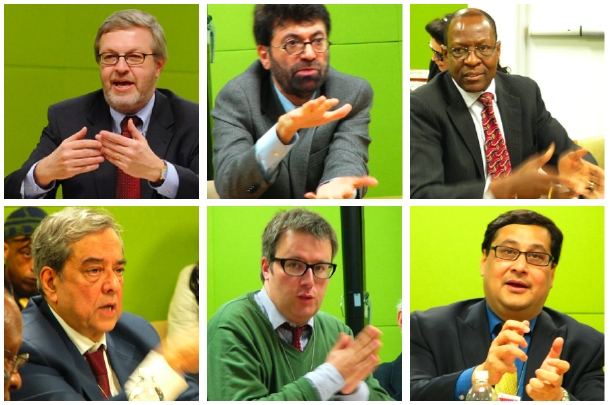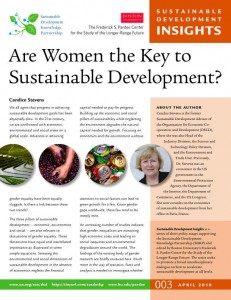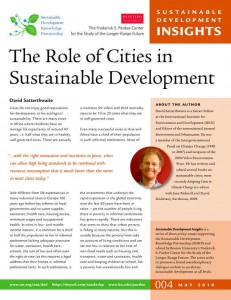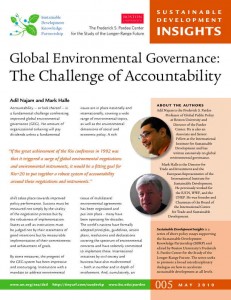Pardee Center Hosts Event on Sustainable Development Governance at the United Nations
The Boston University Frederick S. Pardee Center for the Study of the Longer-Range Future and the Sustainable Development Knowledge Partnership (SDKP) hosted a seminar at the United Nations Headquarters in New York on “Governance for Sustainable Development: Institutional Challenges for Rio+20“ on Wednesday, May 12, 2010. Nearly 60 people attended in a packed conference room and heard six eminent panelists list to a range of innovative ideas about how to improve global sustainable development governance.

The speakers on the panel included: Amb. Carsten Staur, Permanent Representative of Denmark to the United Nations; Amb. Kaire Mbuende, Permanent Representative of Namibia to the United Nations; Dr. Ashok Khosla, President of the International Union for Conservation of Nature (IUCN); Dr. Tariq Banuri, Director for the UN Division of Sustainable Development; Dr. Tom Bigg, Head of Partnerships for the International Institute for Environment and Development; and Prof. Adil Najam, Director of the Frederick S. Pardee Center for the Study of the Longer-Range Future. The session was moderated by Dr. Miquel Munoz, Pardee Center.
The event was held as part of the Eighteenth meeting of the United Nations Commission on Sustainable Development (UN CSD) during the ‘high-level segment’ of the CSD and right before the commencement of the PrepCom meeting for the 2012 United Nations Conference on Sustainable Development, during which the sustainable development governance is one of two key issues for discussion (the other being ‘green economy’).

Opening the discussion, Ambassador Carsten Staur of Denmark said Rio+20 is an opportunity to reinvent Sustainable Development. In particular, he noted that Rio+20 provides the opportunity to truly bring together development and environment, which now have separate tracks at the international level. He stressed that climate change has raised the poltical profile of environmental and development issues and highlighted the importance of evidence-based approaches and the high-level finance group.
Dr. Tariq Banuri stressed the need to focus on sustainable development, rather than just environmental issues. He said the true challenge for 2012 is to address the issues where there are genuine trade offs between environment and development.
Ambassador Kaire Mbuende of Namibia said the responsibility of CSD is to provide policy guidance and to mainstream sustainable development to other areas. He said the missing link is to move to the national and implementation levels. He noted tha climate change is a catalyst for resource mobilization.
Dr. Ashok Khosla said the UN should be a catalyst for action outside the UN. He stressed the importance of generating and disseminating knowledge, for instance on water issues. He advocated the creation of a Consultative Group on Technologies and Solutions for Sustainable Development.
Dr. Tom Bigg underscored the importance of the local dimension and bottom-up approaches. He noted the relevance of local governance and actors to global processes, and the need to strengthen the linkages between the international and the local levels, particularly finance flows. He said Rio+20 should provide the enabling environment for local governance.
In his remarks, Dr. Adil Najam said Rio+20 is well-timed because there is an appetite for systemic change, and it comes at a time of renewed confidence in the South and, possibly, a new humility in the North. Noting that we have created a system of negotiation rather than implementation, he underscored accountability as one of the main objectives for Rio+20.
In the ensuing discussion, the public highlighted issues of knowledge sharing, capacities of civili society, the role of markets, the lack of media relevance of CSD, and the increasing focus on climate change at the expense of other environmental issues.
The event will also serve as the launch of three new policy papers in teh Pardee Center/SDKP series Sustainable Development Insights. The three new papers, are byCandice Stevents on women and sustainable development (SDI 003), by David Satterthewaite on cities and sustainable development (SDI 004), and by Adil Najam and Mark Halle on accountability as a tool of global governance (SDI 005). This follows on two earlier papers in the series: Alan AtKisson on “pushing reset” on sustainable development (SDI 001) and Miquel Munoz and Adil Najam on setting priorities for Rio+20 (SDI 002).
The Pardee Center had also hosted a side-event seminar at the 17th Meeting of the CSD in 2009.


